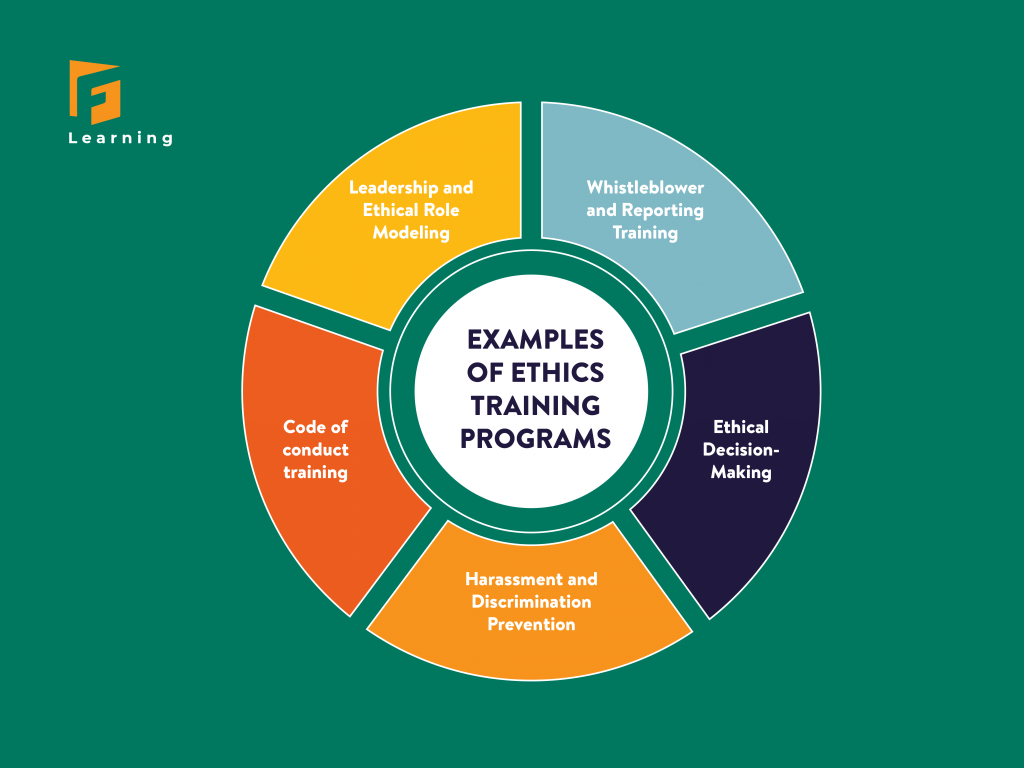Ethics training is a cornerstone of cultivating an ethical workplace culture, fostering responsible decision-making, and ensuring long-term success for organizations. However, traditional approaches to ethics training often need to be revised to create a lasting impact. In this blog, we’ll explore 5 innovative strategies to enhance significantly ethics training methods, leading to more engaged participants and meaningful outcomes.
What is ethics training?
Ethics training refers to a structured educational process that aims to provide individuals with an understanding of ethical principles, values, and guidelines within a particular context, such as a profession, organization, or society. The purpose of ethics training is to enhance individuals’ awareness of ethical issues, dilemmas, and responsibilities, and to equip them with the knowledge and skills needed to make morally sound decisions in various situations
The value of ethics training programs to your business
Ethics training programs can bring significant value to a business in various ways:
#1 Risk Mitigation
Ethics training helps employees understand and navigate ethical dilemmas, reducing the likelihood of unethical behavior that could lead to legal issues, regulatory violations, reputational damage, and financial losses.
#2 Branding Enhancement
A strong commitment to ethics and integrity can enhance a company’s reputation, leading to increased trust from customers, partners, investors, and the general public. This can result in a competitive advantage and better relationships with stakeholders.
#3 Employee Morale and Engagement
Providing ethics training demonstrates an organization’s dedication to creating a positive work environment. Employees who feel that their company prioritizes ethical behavior are more likely to be engaged, motivated, and proud of their association with the organization.
#4 Talent Attraction and Retention
Companies known for their ethical standards tend to attract and retain high-quality employees who share those values. Talented individuals are more likely to be attracted to workplaces that align with their personal ethics.
5 Effective Strategies to Enhance Ethics Training
#1 Interactive Scenario-Based Learning
Engagement and retention skyrocket when participants actively apply ethical principles to real-world scenarios. Move beyond monotonous lectures and incorporate interactive scenarios that mirror individuals’ challenges in their roles.
This approach promotes critical thinking and empathy by allowing participants to make decisions and witness the consequences. Encourage open discussions on alternative viewpoints, fostering a deeper understanding of ethical nuances.
#2 Inclusive and Diverse Perspectives
Ethics training gains depth when it incorporates a variety of perspectives and experiences. Embrace diversity by involving individuals from different backgrounds and roles in designing and delivering training content. Incorporate case studies that reflect the global nature of modern workplaces, addressing cultural, social, and ethical variations.
By exploring ethical challenges through various lenses, participants learn to navigate complex situations with sensitivity and respect.
#3 Digital Simulations and Gamification
Harness the potential of technology by integrating digital simulations and gamification elements into ethics training. Interactive simulations immerse participants in realistic scenarios where their choices drive the outcomes. Gamification elements, such as leaderboards and rewards, add a sense of achievement and healthy competition.
This approach enhances engagement and helps participants understand the consequences of their actions in a risk-free environment.
One of the challenges in ethics training is conveying intricate ideas and models. Digital simulation, like animation, allows companies to visually represent abstract concepts, such as different leadership styles, communication techniques, and conflict resolution strategies.
In the below training session video of integrity value, look at how F.Learning studio effectively applies animation to create dynamic and impactful training experiences. Participants, therefore, can better grasp and retain the information by transforming these concepts into visual narratives.
Want to include digital simulations and gamification in your training? Choose the right partner to bring your ideas to life:
Read more: Top 12 Amazing Training Video Production Companies In 2024
#4 Interactive Workshops and Role-Playing
Combine the excitement of workshops with ethical dilemmas for a dynamic learning experience. Participants form teams and tackle complex ethical challenges, brainstorming creative solutions within a limited time. This approach cultivates teamwork, adaptability, and outside-the-box thinking. Moreover, the competitive element adds an element of excitement that can make ethics training more engaging and memorable.
#5 Storytelling and Real-Life Experiences
Stories have the power to captivate and resonate with audiences. Invite guest speakers who have faced ethical dilemmas in their careers to share their experiences. Personal narratives add a human touch, making ethical concepts relatable and memorable. Participants gain insights into real-world decision-making processes, inspiring them to approach their ethical challenges with a renewed perspective.
5 examples of ethics training programs

Ethics training programs are designed to educate individuals on ethical principles, decision-making, and behavior in the workplace. Here are some examples of ethics training programs that organizations might implement:
#1 Code of Conduct Training
This example of ethics training program focuses on familiarizing employees with the organization’s code of conduct, policies, and ethical guidelines. It covers topics such as conflicts of interest, confidentiality, gifts and entertainment, and appropriate behavior in various situations.
#2 Harassment and Discrimination Prevention
This ethics training program example addresses issues related to workplace harassment, discrimination, and bias. It educates employees on recognizing and reporting inappropriate behavior, fostering a respectful and inclusive work environment.
#3 Whistleblower and Reporting Training
This ethics training course teaches employees to report ethical violations or concerns safely and without fear of retaliation. It educates them about the organization’s reporting mechanisms and the importance of speaking up.
#4 Ethical Decision-Making
This ethics training program delves into making ethical decisions by presenting participants with complex scenarios and dilemmas. It equips them with frameworks for analyzing situations, considering different perspectives, and arriving at morally sound choices.
#5 Leadership and Ethical Role Modeling
Geared towards managers and leaders, this example of ethics training program emphasizes the role of leadership in setting ethical examples. It covers topics like transparency, accountability, and leading by ethical principles.
Read more: The Best 7 Examples of Ethics Training Programs of 2023
Final words
At F.learning studio, we understand that ethics training is more than just the transfer of information; it’s about engaging learners and facilitating meaningful comprehension. In this case, F.learning stands as your trusted animated ethics training partner, bringing expertise and creativity to transform your ethics training programs.




